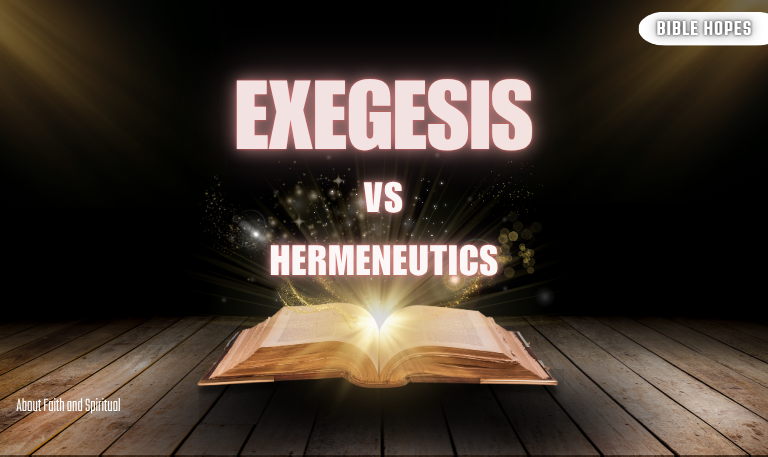In the fields of theology, biblical studies, philosophy, and literary criticism, the terms exegesis and hermeneutics frequently arise—often interchangeably but incorrectly so. Understanding the nuanced differences between exegesis and hermeneutics is essential for students, scholars, pastors, and anyone interested in textual interpretation. This article dives deep into Exegesis Vs Hermeneutics, unpacking definitions, methodologies, historical evolution, and practical applications. With expert insight, comprehensive explanations, and practical guidance, this guide aims to be your authoritative resource on the topic.
1. What is Exegesis?
Exegesis comes from the Greek exēgēsis, meaning “to lead out” or “to explain.” It refers specifically to the critical explanation or interpretation of a text, particularly sacred scriptures like the Bible.
Key Features of Exegesis:
Objective: To uncover the original meaning of the text as intended by the author.
Scope: Focuses mainly on textual analysis — grammar, syntax, historical context, and literary genre.
Methods: Includes linguistic study, cultural background research, and cross-referencing with other texts.
Example: An exegete might analyze the original Hebrew or Greek to clarify ambiguous words or phrases in a biblical passage.
In short, exegesis is the practice of drawing out meaning directly from the text itself.
2. What is Hermeneutics?
Hermeneutics derives from the Greek god Hermes, the messenger who conveyed hidden meanings. Hermeneutics is the broader theory and philosophy of interpretation, encompassing how we understand texts, symbols, and communication beyond the literal.
Read Also: How Tall Was Eve in the Bible
Key Features of Hermeneutics:
Objective: To explore how meaning is constructed, interpreted, and communicated.
Scope: Extends beyond text to include authorial intent, reader’s perspective, cultural and historical contexts, and philosophical assumptions.
Schools: Includes theological hermeneutics, philosophical hermeneutics (e.g., Gadamer, Schleiermacher), and literary hermeneutics.
Example: Hermeneutics might analyze how a biblical text’s meaning changes when viewed through modern cultural or existential lenses.
Hermeneutics provides the framework for understanding texts and guiding exegesis.
3. Key Differences Between Exegesis and Hermeneutics
| Aspect | Exegesis | Hermeneutics |
|---|---|---|
| Definition | Critical explanation of a text’s meaning | Theory and philosophy of interpretation |
| Focus | Textual analysis and original meaning | Broader interpretive framework and meaning |
| Scope | Specific to texts (mainly scripture) | Includes texts, symbols, communication |
| Methodology | Linguistic, historical, grammatical study | Philosophical, cultural, reader-response |
| Goal | To uncover author’s intended meaning | To understand how meaning is constructed |
Hermeneutics and exegesis work hand-in-hand:
Hermeneutics is the theory that guides interpretation principles.
Exegesis is the practice of applying those principles to uncover textual meaning.
Without hermeneutics, exegesis lacks a methodological foundation. Without exegesis, hermeneutics is purely theoretical.
5. Historical Development and Evolution
Ancient Origins
Hermeneutics has roots in ancient Greek philosophy and Jewish biblical interpretation. Early hermeneutics sought to unlock allegorical and literal meanings of sacred texts.
Medieval and Reformation Era
The medieval church emphasized exegesis to defend doctrine. The Protestant Reformation championed sola scriptura, fueling advances in exegetical methods to interpret scripture directly.
Modern Period
Philosophers like Friedrich Schleiermacher and Hans-Georg Gadamer developed hermeneutics as a philosophical discipline focusing on the fusion of horizons — bridging the gap between text and reader.
6. Exegesis Vs Hermeneutics in Biblical Studies
Exegesis focuses on careful, systematic study of biblical texts in original languages (Hebrew, Aramaic, Greek).
Hermeneutics involves reflecting on how those texts relate to contemporary contexts and theological doctrines.
Example:
A biblical scholar uses exegesis to understand the meaning of “logos” in John 1:1 by studying the Greek term and Jewish philosophical background. Then, hermeneutics helps apply this understanding in modern Christian theology.
7. Applications in Literary Criticism
Though primarily associated with biblical studies, these concepts apply to literature:
Exegesis can mean detailed textual analysis of a novel or poem, focusing on author’s words, style, and narrative.
Hermeneutics explores how readers interpret themes, symbols, and meanings influenced by their contexts.
8. Step-by-Step Guide to Conducting Exegesis
Choose the Text – Select the passage or text for analysis.
Textual Criticism – Verify the original wording using manuscripts.
Linguistic Analysis – Study the grammar, vocabulary, and syntax.
Historical-Cultural Context – Research the background and culture of the time.
Literary Context – Understand genre, structure, and surrounding passages.
Cross-referencing – Compare with parallel passages or related texts.
Synthesize Findings – Draw conclusions about original meaning.
9. Step-by-Step Guide to Hermeneutical Interpretation
Identify the Framework – Choose a hermeneutical theory or approach.
Understand Authorial Intent – What did the author mean?
Consider Reader’s Context – How does the reader’s perspective shape meaning?
Analyze Cultural and Historical Influences – How do contexts affect interpretation?
Dialogue Between Text and Reader – Engage critically and reflectively.
Apply Philosophical Insights – Explore existential, ethical, or theological implications.
10. Common Misconceptions
They are the same thing. Exegesis is a subset of hermeneutics.
Exegesis is always objective; hermeneutics is subjective. Both involve interpretation but at different levels.
Hermeneutics is only for religious texts. It applies broadly in philosophy, law, and literary theory.
11. Essential Tools and Resources
For Exegesis:
Bible concordances (e.g., Strong’s Concordance)
Lexicons (e.g., BDAG for Greek)
Commentaries (e.g., NICNT, NIGTC)
Original language texts (Hebrew OT, Greek NT)
For Hermeneutics:
Philosophical works (e.g., Gadamer’s Truth and Method)
Hermeneutical frameworks (e.g., Reader-Response Theory)
Scholarly articles and journals
12. The Role of Culture and Context
Interpretation is never done in a vacuum. Both exegesis and hermeneutics must account for:
Cultural backgrounds of authors and readers
Historical circumstances shaping the text
Modern contexts influencing understanding
This dynamic interaction shapes the richness of textual interpretation.
Read Also: Catholic Vs Orthodox
13. Exegesis and Hermeneutics Across Religions
Jewish tradition: Midrash and Talmudic interpretations involve exegesis and hermeneutics.
Islamic tradition: Tafsir (exegesis) and Usul al-Tafsir (hermeneutics).
Christianity: Diverse hermeneutical schools impact doctrine and practice.
14. Challenges and Contemporary Critiques
Subjectivity: Hermeneutics faces criticism for interpretive relativism.
Limitations of Language: Exegesis may not fully capture nuances lost in translation.
Postmodern Views: Challenge fixed meanings and highlight multiplicity of interpretations.
15. Future Directions
Digital Humanities: Use of AI and software for textual analysis.
Interdisciplinary Hermeneutics: Bridging literature, sociology, and theology.
Global Hermeneutics: Embracing diverse cultural perspectives in interpretation.
Exegesis vs Hermeneutics FAQs
Q: What is the main difference between exegesis and hermeneutics?
A: Exegesis is the practical process of interpreting texts, focusing on original meaning, while hermeneutics is the overarching theory and philosophy guiding how interpretation happens.
Q: Can exegesis exist without hermeneutics?
A: No, hermeneutics provides the framework and principles without which exegesis would lack methodological grounding.
Q: Which is more important in Bible study?
A: Both are essential. Exegesis uncovers original meanings, and hermeneutics helps apply those meanings in contemporary contexts.
Q: Are exegesis and hermeneutics only used in religious studies?
A: No, they also apply in literature, law, philosophy, and other fields involving textual interpretation.
Q: How can I learn exegesis and hermeneutics?
A: Start with foundational texts, take courses in biblical studies or philosophy, and practice with real texts alongside scholarly commentaries.
Conclusion
Understanding the nuanced but vital difference between exegesis and hermeneutics empowers deeper textual engagement and more meaningful interpretation. Exegesis brings the original text to light, while hermeneutics frames that understanding within broader interpretive conversations. Together, they remain indispensable tools for scholars, theologians, and thoughtful readers worldwide.



![15 Pink Bible Verses | Discover Meaning, Love [2025 Guide] 5 15-Pink-Bible-Verses-Discover-Meaning,-Love-[2025-Guide]](https://biblehopes.com/wp-content/uploads/2025/05/15-Pink-Bible-Verses-Discover-Meaning-Love-2025-Guide.png)